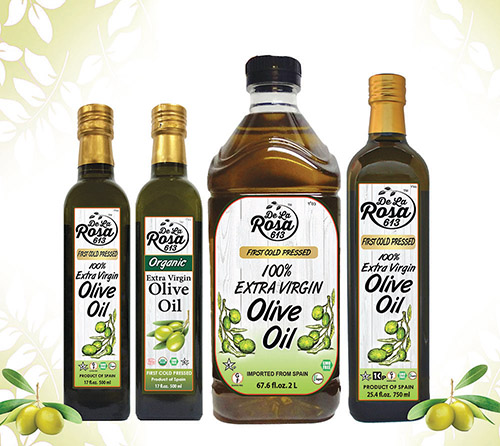

(Courtesy of De La Rosa Foods) Put a little in a wine glass. Swirl it around. Cup the glass in one hand. Use the other hand to cover the glass to trap the aromas. Hold it, swirl it, warm it for a minute or two. Then stick your nose into the glass and take a good whiff of the aroma, or “nose.”
Wait, are we talking about wine? No, olive oil: fresh extra-virgin olive oil.
There are many similarities between olive oil and wine. There are professional olive oil tasters just like there are wine experts. Oil connoisseurs really know what is the best “nose” and the best taste.
So now that you smelled it, take a big gulp, run it around your mouth and do a sharp intake of air into your mouth to force the oil to the back of your throat and swallow.
Wow! Slightly fruity while in my mouth, but what is that peppery feeling in the back of my throat? Sharp. Intense. Cough. Oh, no. But actually…oh, yes!
“That intense peppery feeling, that sense of pungency, is one of the positive attributes of what makes an olive oil a better olive oil,” stated Yehudith Girshberg, CEO and founder of De La Rosa Real Foods and Vineyards. “The third of the three positive attributes of olive oil, in addition to fruity and pungent, is bitter. Bitterness, like pungency, is a known sign of the presence of phenolic compounds in extra-virgin olive oil. As anyone who has ever tasted an olive right off the tree can attest, bitter is a prominent taste in fresh olives.”
Having a bitter sensation on the tongue or a back-of-the-throat sting is one of the best indications of an extra-virgin olive oil’s antioxidant and anti-inflammatory value. It is the flavonoid polyphenols in olive oil that contribute to a bitter taste and resistance to oxidation. These polyphenols are strong antioxidants and have been shown to provide a host of beneficial effects, from healing sunburn to lowering cholesterol, blood pressure and risk of coronary disease.
A recent study published in the Olive Oil Times (March 2020) stated that most American consumers do not like bitterness in the extra-virgin olive oil (EVOO)…as they perceive the bitterness in the EVOO to be a negative while it is actually a positive. Bitterness is in fact a characteristic of true and fresh extra-virgin olive oil, but none of the consumers in the study preferred this. Consumers actually wanted to pay $1.27 less for a litre of “bitter” oil than they would for a smoother-tasting oil.
A study from the University of California, Davis, from 2011, found that 44% of consumers in the U.S. liked defects like rancidity, fustiness, mustiness and winey flavor in their olive oil. The authors indicate this may be due to the large amount of defective olive oil labeled as extra-virgin available to consumers. In other words, because there is such a large amount of defective oil in the market and people are used to consuming it, they think that this is what olive oil is supposed to taste like.
“Most Americans are not really that familiar with olive oil. Americans did not grow up with olive oil. Per capita consumption in the U.S. lags behind consumption of olive oil elsewhere,” Yehudith Girshberg stated.
Albania and Syria lead the way in global table olive consumption per capita, with the two Mediterranean nations consuming 10.8 and 10.1 kilograms per person each year, respectively.
By comparison, the United States only consumes 0.6 kilograms per capita—which is only about 5-6% of what the Albanians consume.
The USA has never been a country that produced a lot of olive oil. The largest producers of olive oil are Greece, Italy and Spain. So of course people living in those countries know a lot more than Americans about olive oil. And the Mediterranean diet includes a lot of extra-virgin olive oil.
De La Rosa products can be found in your local kosher or gourmet markets as well as at www.Delarosa613.com.










